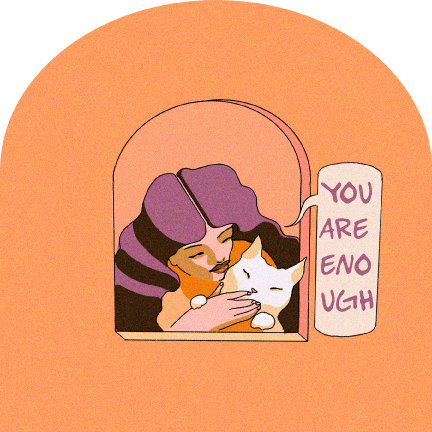- Beavers Digest / Cascades
- Beavers Digest / Cascades / Experience
- Beavers Digest / Culture
- Beavers Digest / Culture / Expression
- Beavers Digest / Experience
- Beavers Digest / Experience / Wellness
It’s harmful to compare yourself to others

Girl comforts her cat in the peace of their home.
November 21, 2021
Instagram is filled with millions of people sharing a part of their life for others to see. Influencers going on vacation, models with your dream body or even just seeing friends going out are all factors that may harm your perception of yourself.
Most students use social media, but they are also at risk of harming themselves when they compare themselves to others, whether that be online or academically.
Our phones are constantly stuck to us like glue. People bring their phones everywhere, keeping an eye on it at all times.
That’s why when a notification pops up, people can’t help but check it out. Most likely, it’s a notification on a social media app.
Upon opening the app, students may see insanely good looking people, and a simple glimpse is enough to start feeling bad about themselves.
When students at Oregon State University were asked if they compare themselves to others on social media, some of them answered that they do.
Ryleigh Royster, a freshman at OSU said, “yes, I do because the standard of beauty is very high and it’s hard not to compare yourself to people like Kendall Jenner or Zendaya. I try not to compare myself, but it’s hard when everyone on social media can easily hide behind a screen and body shame or degrade people.”
Society has created unrealistic expectations for people when it comes to body image.
Models like Kendall Jenner set the unattainable standards that women should fit into clothes that may also fit a 12-year-old kid. This can cause people to start developing eating disorders among many additional mental health detriments.
Michelle Tran, a student majoring in biohealth sciences at OSU, said, “of course, all the time. I mean it’s kind of hard to not compare yourself to others you know? You see people living their lives, going to places and living your dream while you’re stuck at home. Or you see pictures of models and influencers with your ideal body type or look and you instantly start feeling bad about yourself. When I open social media, it’s the first thing I see so it’s hard to avoid.”
Some students may use social media only for contacting others. Such as having a group chat with the people in their class, but it’s hard to avoid seeing posts that can harm their mental health when it’s right there.
In addition, students may not only compare themselves to others on social media, but may also compare themselves with others academically.
Thinking they’re not smart enough as the people around them, or comparing test scores can harm their mental health as well.
When asked if academic comparison was a factor in people’s lives, Claudia Garcia, an OSU freshman, said, “there are times when I find myself comparing myself to others academically. It’s difficult especially when you have set standards that you know are too high for yourself. It is especially unavoidable when family members expect you to perform a certain way in order for you to make them proud. Thus, when I find that classmates get a better grade than me I bring myself down by saying ‘you could have studied more’ or ‘maybe if you didn’t procrastinate you could’ve gotten a better grade.’”
External factors can definitely come into play when it comes to academic success. Such as family members, environment and even friends can all affect the outcome of how you view yourself academically.
It’s hard to stop analyzing the success of others to your own achievements.
All students learn at a different pace and each person has their own set of problems to deal with beyond school, so everyone’s achievements will be attained at a different time.
It doesn’t make anyone less smart or talented because one person’s success doesn’t have to automatically be yours as well.
On a more positive note, to find confidence and love within yourself, the Yes I Am club at OSU can help.
Arman Askari, the founder of the Yes I Am club, has mentioned that the club is a trustworthy space that has open and vulnerable conversations about people’s experiences and life stories.
To build self confidence, Askari said, “you will be truly confident when you accept who you are as a person and events that have happened in the past that have shaped your personality. The self-acceptance will help with improving your physical, emotional, mental and spiritual health which will help you to be more confident and happier.”
So how do you become comfortable within yourself?
There are many ways that can help. Such as stop seeking validation for people, finding a support group or even finding professional help can assist in being comfortable in your own skin.
It’s different for everyone, of course, and there’s no right or wrong answer, but according to Askari, “you first have to accept the problem.”





